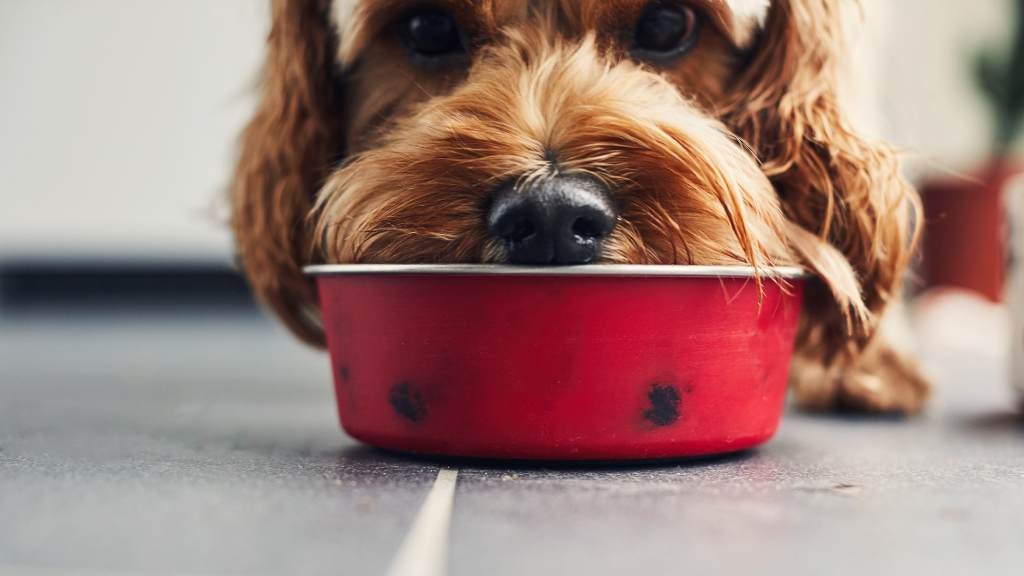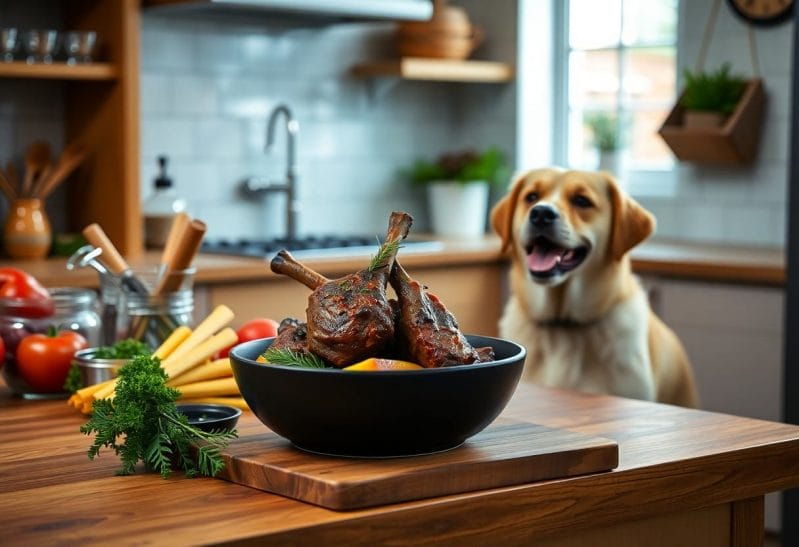Mistakes in your dog’s diet can have a significant impact on their health and well-being. In this informative blog post, we will explore common errors pet owners make when feeding their furry companions. By following simple guidelines and avoiding these pitfalls, you can ensure your dog receives the nutrition they need to thrive.
Key Takeaways:
- Consult a veterinarian: Always consult with a veterinarian to determine the best diet for your dog based on its size, breed, age, and any health concerns.
- Avoid human foods: Many human foods are toxic to dogs, such as chocolate, onions, and grapes. Stick to a balanced dog food diet to ensure your pet’s health and well-being.
- Watch portion sizes: Overfeeding your dog can lead to obesity and other health issues. Follow the recommended portion sizes provided by your veterinarian or dog food packaging.
Inadequate Nutrition
While it’s important to feed your dog a balanced diet, inadequate nutrition is a common mistake many dog owners make. This can lead to various health issues and deficiencies that can impact your dog’s overall well-being. Inadequate nutrition can stem from not providing enough nutrients or feeding your dog a diet that lacks important components for their health.
Insufficient Protein
Protein is a crucial nutrient for dogs as it plays a vital role in muscle development, immune function, and overall health. A common mistake dog owners make is not providing enough protein in their dog’s diet. Dogs require a higher protein intake compared to humans, and inadequate protein can lead to muscle weakness, poor growth, and a weakened immune system. Make sure your dog’s food contains sufficient levels of high-quality protein sources like meat, fish, and eggs to meet their dietary needs.
Lack of Essential Vitamins and Minerals
On top of protein, dogs require important vitamins and minerals to support their overall health and well-being. A lack of these vital nutrients can lead to various deficiencies that can affect your dog’s physical and mental health. Vitamins like vitamin A, B, C, D, and minerals such as calcium, phosphorus, and iron are crucial for your dog’s growth, immune function, and metabolic processes. Ensure your dog’s diet is well-balanced and provides all the necessary vitamins and minerals to prevent deficiencies and promote optimal health.
The lack of important vitamins and minerals in your dog’s diet can lead to a variety of health issues, including weakened bones, poor coat condition, and a compromised immune system. To avoid these issues, consider incorporating a complete and balanced commercial dog food that meets your dog’s nutritional requirements. Consult with your veterinarian to determine the best diet plan for your dog based on their age, size, and activity level.
Recognizing the Signs of Overfeeding
The key to preventing obesity in dogs is recognizing the signs of overfeeding. Dogs that are overfed may exhibit symptoms such as weight gain, lethargy, difficulty breathing, and digestive issues. It’s important to monitor your dog’s body condition score and adjust their food intake accordingly to maintain a healthy weight.
Health Risks Associated with Obesity
Obesity in dogs can lead to a multitude of health problems, including joint pain, diabetes, heart disease, and decreased life expectancy. It’s crucial to keep your dog at a healthy weight to ensure their overall well-being and quality of life.
Recognizing the serious health risks associated with obesity in dogs is vital for pet owners. Research shows that overweight dogs are more likely to develop chronic conditions that can significantly impact their quality of life and longevity.
To avoid overfeeding your dog, it’s important to consult with your veterinarian to determine the appropriate amount of food for your dog’s breed, size, age, and activity level. Additionally, be mindful of portion sizes and avoid overindulging your furry friend with treats. By monitoring your dog’s weight and adjusting their diet as needed, you can help prevent the detrimental effects of overfeeding and obesity.
Feeding Table Scraps
Why Table Scraps are Bad for Your Dog
To avoid common mistakes when feeding your dog, it’s crucial to understand why table scraps can be harmful to your furry friend. Table scraps often contain high levels of fat, seasonings, and other ingredients that can upset your dog’s stomach and lead to gastrointestinal issues. Feeding your dog table scraps can also result in obesity and nutrient deficiencies, as human food does not provide the balanced nutrition that dogs need to thrive.
Healthy Alternatives to Table Scraps
Table scraps are not the only way to show your dog love and affection. Instead of feeding your dog from your plate, consider offering healthy alternatives such as fresh fruits and vegetables, lean meats, and dog-friendly treats. These options can provide your dog with vital nutrients without the risks associated with table scraps.
Scraps from your meal may seem like a quick and easy way to treat your dog, but in the long run, they can have negative effects on your dog’s health. By opting for healthy alternatives, you can ensure that your dog stays happy, healthy, and well-nourished.
Ignoring Food Allergies and Intolerances
For dogs, just like humans, food allergies and intolerances can cause a range of health issues. Ignoring these sensitivities can lead to discomfort and potentially more serious conditions for your beloved pet. It’s crucial to be aware of common food allergens and how to identify food intolerances in order to provide the best nutrition for your dog.

Common Food Allergens
Allergens such as beef, dairy, wheat, chicken, egg, corn, soy, and fish are among the most common food triggers for dogs. Some dogs may also develop allergies to certain additives or preservatives found in commercial dog foods. If you notice symptoms like itching, excessive licking, ear infections, gastrointestinal issues, or skin rashes, it may be worth exploring a potential food allergy or intolerance.
Identifying Food Intolerances
Food intolerances in dogs are different from allergies and typically involve difficulty digesting certain food components. Symptoms of food intolerance can include chronic ear infections, diarrhea, gas, or bloating. To identify potential food intolerances, you may need to conduct an elimination diet by gradually removing suspected ingredients from your dog’s diet and reintroducing them one at a time to pinpoint the problematic food.
Food intolerances can sometimes be tricky to diagnose, as symptoms may not appear immediately or can be subtle. Keeping a food diary to track your dog’s meals and any associated symptoms can help you and your veterinarian identify patterns and narrow down potential culprits.
Inconsistent Feeding Schedules
Once again, consistency is key when it comes to feeding your beloved canine companion. Dogs thrive on routine, and an inconsistent feeding schedule can lead to a variety of issues, both behavioral and health-related. From weight management problems to digestive issues, irregular feeding schedules can have a negative impact on your dog’s overall well-being.
Establishing a Regular Feeding Routine
Feeding your dog at the same times each day helps regulate their metabolism and keeps their energy levels stable. Establishing a regular feeding routine also makes it easier to monitor your dog’s appetite and detect any changes that may indicate an underlying health issue. Whether you choose to feed your dog once or twice a day, sticking to a consistent schedule will help keep your furry friend happy and healthy.
Avoiding Meal Skipping and Irregular Feeding
Irregular feeding patterns, such as skipping meals or free-feeding, can disrupt your dog’s digestion and lead to picky eating habits. Dogs are creatures of habit, and when their meals are inconsistent, they may become anxious or agitated. Avoid skipping meals or leaving food out all day, as this can lead to obesity and other health problems in the long run.
The key to maintaining a healthy and happy dog is to establish a regular feeding routine and stick to it. Your furry friend will thank you for providing them with the consistency and structure they need to thrive.
Not Monitoring Food Quality
Many dog owners unknowingly make the mistake of not monitoring the quality of the food they are feeding their pets. This can have a significant impact on your dog’s overall health and well-being. It is imperative to pay attention to what you are feeding your furry friend to ensure they are receiving the proper nutrition they need to thrive.

Reading Labels and Identifying Fillers
To avoid the mistake of feeding your dog low-quality food, it is crucial to take the time to read and understand the labels on dog food packages. Look out for fillers such as corn, wheat, and soy, which provide little nutritional value and can even be harmful to your dog’s health. Opt for dog foods that list meat as the primary ingredient and avoid products with excessive additives and artificial preservatives.
Choosing High-Quality Dog Food
To ensure your dog is getting the best possible nutrition, choose high-quality dog food made from wholesome ingredients. Look for options that contain real meat, whole grains, fruits, and vegetables to provide a balanced diet for your pet. Avoid generic or generic-branded dog foods that may contain lower-quality ingredients that could potentially harm your dog in the long run.
Understanding the importance of feeding your dog high-quality food is crucial for their overall health and well-being. By being mindful of the ingredients in your dog’s food and opting for nutritious options, you can help your furry friend live a long and healthy life.
Conclusion
Conclusively, it is necessary for dog owners to be aware of the common mistakes to avoid when feeding their furry companions. By understanding the importance of a balanced diet, portion control, and the dangers of certain foods, pet owners can ensure their dogs maintain optimal health and well-being. Avoiding these mistakes can lead to a happier and healthier life for our beloved canine friends.
Do not forget, our dogs rely on us to provide them with the best care possible, including proper nutrition. By being mindful of these common mistakes and making the necessary adjustments to their feeding routines, we can help our dogs live longer, healthier, and more fulfilling lives.
FAQ
Q: What are some common mistakes to avoid when feeding your dog?
A: When feeding your dog, avoid feeding them human food, overfeeding, inconsistent feeding schedules, not providing enough water, and using incorrect feeding bowls.
Q: Why should I avoid feeding my dog human food?
A: Human food can be harmful to dogs as some ingredients are toxic to them, such as chocolate, grapes, onions, and garlic. Stick to a balanced dog diet to ensure their health and well-being.
Q: How can overfeeding impact my dog’s health?
A: Overfeeding can lead to obesity, which can cause various health problems for your dog, such as diabetes, joint issues, and heart disease. Be mindful of portion sizes and follow feeding guidelines.
Q: Why is it important to maintain a consistent feeding schedule for my dog?
A: Dogs thrive on routine, and inconsistent feeding schedules can cause stress and anxiety. Establish a regular feeding routine to promote a sense of security and well-being for your dog.
Q: How can the type of feeding bowl affect my dog’s eating habits?
A: The type of feeding bowl you use can impact your dog’s eating habits. For example, some dogs may eat too quickly from a shallow bowl, leading to digestive issues. Choose a bowl that suits your dog’s size and eating style to promote healthy eating habits.








